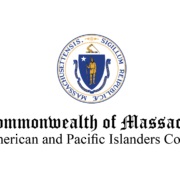The Massachusetts Asian American Commission Announces Name Change
We are excited to announce that we are officially the Asian American and Pacific Islanders Commission (AAPIC). The name change was signed into law by Governor Charlie Baker on July 16, 2021.
We hope to expand our partnerships with organizations and communities as we move forward, furthering our commitment to advance greater collaboration and unity of Asian American and Pacific Islanders communities across the Commonwealth. This name change represents the Commission’s effort to honor, celebrate, and recognize the full diversity of Asian American and Pacific Islander residents in Massachusetts.
Press Release | Official Statement
Today, on November 23, 2021, the Massachusetts Asian American Commission announced that it has formally changed its name to the Massachusetts Asian American and Pacific Islanders Commission (AAPIC) to reflect our communities’ diversity and celebrate the vibrant history and culture of Pacific Islanders across the Commonwealth. Governor Charlie Baker signed the name change into law on July 16, 2021, as part of the FY22 enacted state budget.
Established on October 29th, 2006, the Massachusetts Asian American and Pacific Islanders Commission (AAPIC) is a permanent statewide body dedicated to advocating for Asian Americans and Pacific Islanders.
AAPIC Chair, Sam Hyun, “We have updated our name to include Pacific Islanders formally to our name. We are committing to ensure that the Commission’s programming, education, and policy efforts include and uplift the interests of all AAPI residents in Massachusetts.”
In the 1980s, the term AAPI was first introduced by the federal government, at the time of the emerging Asian American and Pacific Islander groups, but this did not address the concerns over the erasure of Pacific Islanders communities. We understand that changing our name does not solve the problem of including Pacific Islanders, or Oceania, whose origins are the original peoples of Melanesia, Micronesia, or Polynesia, into the representation. Instead, we are creating and committed to making space, while holding ourselves accountable to give the people of Oceania their own platform. As there is not clear disaggregated data on the vast representation of the AAPI community, we are unable to provide more detailed insights on the Pacific Islander community.
Pacific Islanders history can be traced back to the influence of European colonizers. The three regions were a product of European designations and these subregions today are heavily regulated and impacted by colonial governments. It is crucial to understand these truths but to bring out the stories and histories of PI communities, moving towards a future where all stories are understood and recognized. Pacific Islanders can understand and have a closer connection to the Indigenous and native cultures here in the US.
Native Hawaiian and Pacific Islanders — also known as Pasifika: people from the islands of the South Pacific and their descendants — comprise people from any of the original peoples of Hawai’i, Guam, Samoa, or other Pacific Islands. It also includes people who report their ethnicity as “Fijian,” “Guamanian or Chamorro,” “Marshallese,” “Native Hawaiian,” “Samoan,” “Tongan,” and “Other Pacific Islander” or provides other detailed Pacific Islander responses. Asian Americans include people claiming ethnicities from East Asia, Southeast Asia, and the Indian subcontinent.
In Massachusetts, the 2020 Census data estimates that there are approximately 2,301 Native Hawaiian and Other Pacific Islander residing throughout the Commonwealth. Nationally, there are 689,966 Native Hawaiian and Other Pacific Islander in the United States.
Native Hawaiian Kamalani Yuen said: “Even though the term AAPI is used commonly, it is vital to ensure that we as a Commission are intentional behind celebrating and supporting the diversity of what is encompassed behind the term AAPI.” Ms. Yuen, also AAPI Commission’s Community Engagement Coordinator, continued, “Representation matters, and there must be a seat at the table for Pasifika.”
The Commission’s goal is to recognize and highlight the vital contributions of Asian Americans and Pacific Islanders to the social, cultural, economic, and political life of the Commonwealth; to identify and address the needs and challenges facing residents of Asian and Pacific Islanders ancestry; and to promote the well-being of this dynamic and diverse community, thereby advancing the interests of all who call Massachusetts home.
The AAPIC will continue to promote and engage diverse AAPI communities and residents throughout the Commonwealth by expanding partnerships with organizations and communities and furthering a commitment to advance greater collaboration and unity of Asian American and Pacific Islanders communities across the Commonwealth.
AAPIC’s work will continue by giving Oceania a platform through the following action steps including but not limited to:
- Providing educational programming together with Pacific Islanders
- Strengthening community partnerships with Pacific Islander organizations
- Building a permanent page on the AAPIC’s website providing information and resources on the background, history, and culture of Pacific Islanders
This name change represents the Commission’s effort to honor, celebrate, and recognize the full diversity of Asian American and Pacific Islander residents. All handles to AAPIC’s social media (Facebook, Instagram, Twitter, LinkedIn) have changed to @aapicommission and all emails have the domain ending with @aapicommission.org. The new website domain address will change to www.aapicommission.org by November 30, 2021.
For additional information, please get in touch with Communications and Development Coordinator, Bonnie Chen ([email protected])



